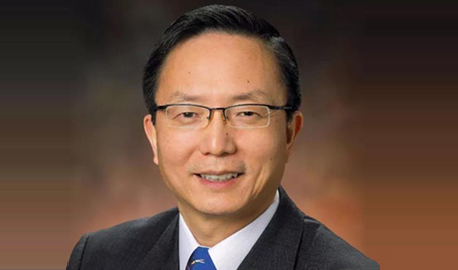

.jpg)

2020
March 18, 2020, Shanghai, China - HaiHe Biopharma, a company focusing on the discovery, development and commercialization of innovative anti-tumor drugs, announced that its subsidiary HaiHe Pharmaceutical and Shanghai Institute of Materia Medica, Chinese Academy of Sciences (hereinafter referred to as "Shanghai Institute of Materia Medica") have reached a cooperation agreement on the STING activator (code "SOMCL-18-202") developed by Shanghai Institute of Materia Medica, under which HaiHe Biopharma will obtain the global exclusive rights in the R&D, production and commercialization of SOMCL-18-202.

“Immuno-oncology is one of the cutting-edge hot topics in the current tumor treatment research. Targeted STING activator is expected to be used alone or in combination to treat patients for which PD-1/PD-L1 appear to be ineffective, so it has broad research prospects. However, the research of the STING activator is not mature enough and globally there are very few small molecules that enter into clinical study, which still faces many challenges. We are very pleased to cooperate with HaiHe Pharmaceutical, and we hope to promote the clinical study of STING activator by relying on the remarkable expertise, rich clinical development experience and keen international vision of HaiHe Pharmaceutical's clinical research team,” said Researcher Zhang Ao from Shanghai Institute of Materia Medica.
SOMCL-18-202 refers to a small molecule immunomodulator with novel mechanisms, which is developed by Shanghai Institute of Materia Medica, and is in the preclinical development phase. The compound targets STING (Stimulator of Interferon Genes) shows a significant anti-tumor activity at the molecular level, cellular level and in vivo of the animals.
Haihe Biopharma is an innovation-driven biotechnology company in China focusing on the discovery, development, production and commercialization of innovative anti-tumor drugs. Haihe brings life-saving therapies to cancer patients worldwide. It also has a research and management team with a global perspective, and is proactively mapping out the international development of innovative drugs. The Company currently has thirteen key drug candidates. As of today, Haihe Biopharma has received 21 IND or clinical trial approvals in four countries and regions.
Please visit the company website for more information: http://www.zztsbc.com
Shanghai Institute of Materia Medica, Chinese Academy of Sciences (hereinafter referred to as “SIMM”), formerly known as Peking Institute of Materia Medica, Academia Sinica, was founded in 1932, moved to Shanghai in 1933, and settled down in Zhangjiang Hi-Tech Park, Pudong New Area in 2003. SIMM is the oldest comprehensive innovative drug research institution in China. Since its establishment, SIMM has developed a number of innovative drugs with certain influence both at home and abroad, which include Artemether (a preferred drug for the treatment of pernicious malaria), Dimercaptosuccinic acid (heavy metal antidote), butoxypiperane (innovative anti-tumor drug), Huperzine-A (innovative drug against Alzheimer’s Disease), Depsides salts (a modern Chinese Medicine) and antofloxacin hydrochloride (a novel fluoroquinolone antibacterial agent). In 2019, GV-971, the world’s first innovative drug for Alzheimer’s disease targeting intestinal flora was approved for marketing in China, bringing an end to the 17-year gap in this field. Over the past few years, SIMM has seized the opportunity of China’s reform and development and established the Institute of Drug Innovation, Chinese Academy of Sciences by consolidating the resources both inside and outside the Institute. SIMM also actively takes part in the construction of Shanghai Science and Technology Innovation Center and has taken the lead to establish the “Zhangjiang Laboratory of Pharmaceutical Science”, with an expectation to work on such goals as to “develop novel drugs” and “develop leading technologies”. By focusing on new drug discovery and new methods and new technologies for drug R&D based on the research of disease mechanisms, effective solutions will be worked out to address those bottleneck issues hindering the R&D and industrial development of biological drugs in China. Based on the foregoing, a novel drug R&D highland with global influence and a world-class pharmaceutical science research center will be built.